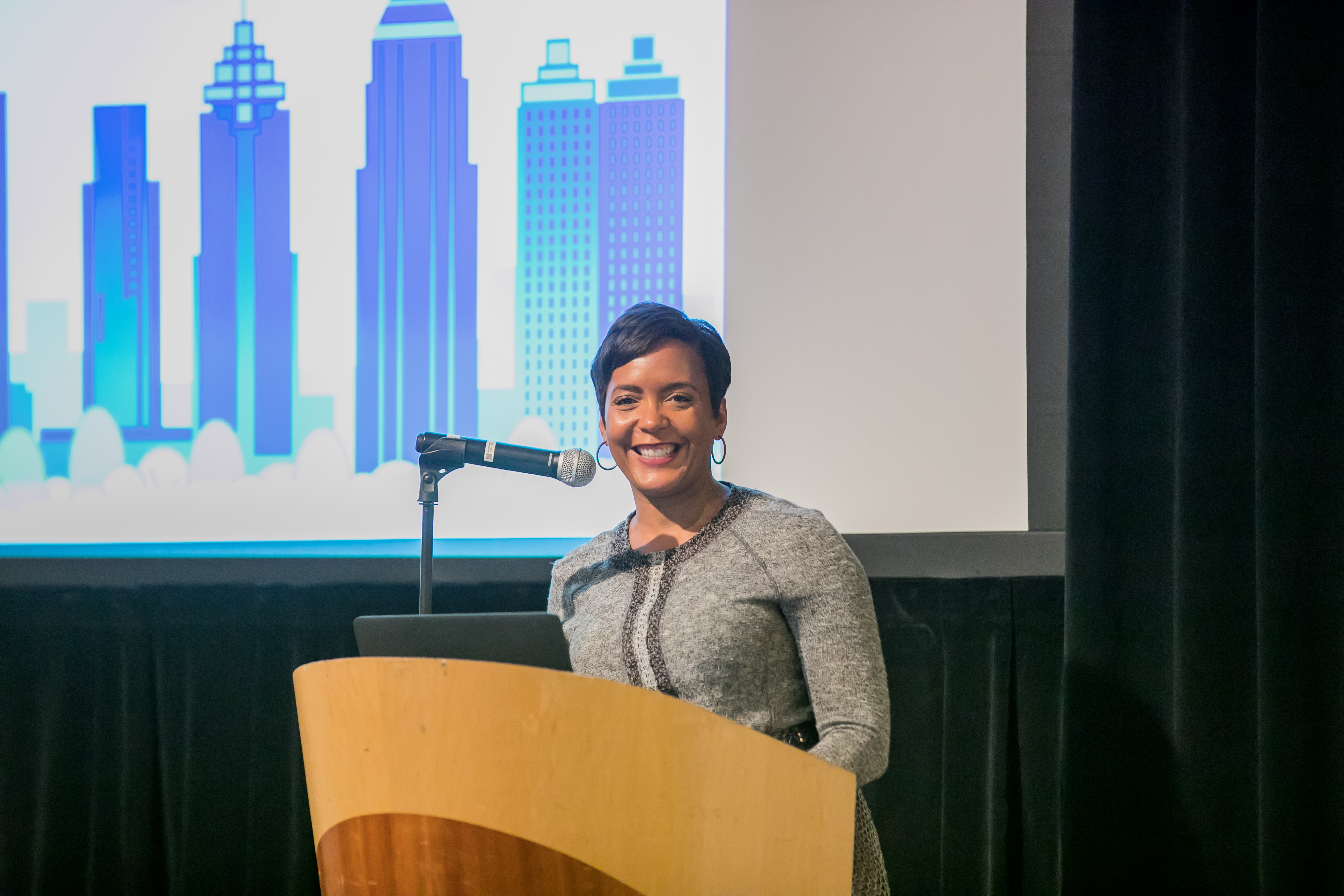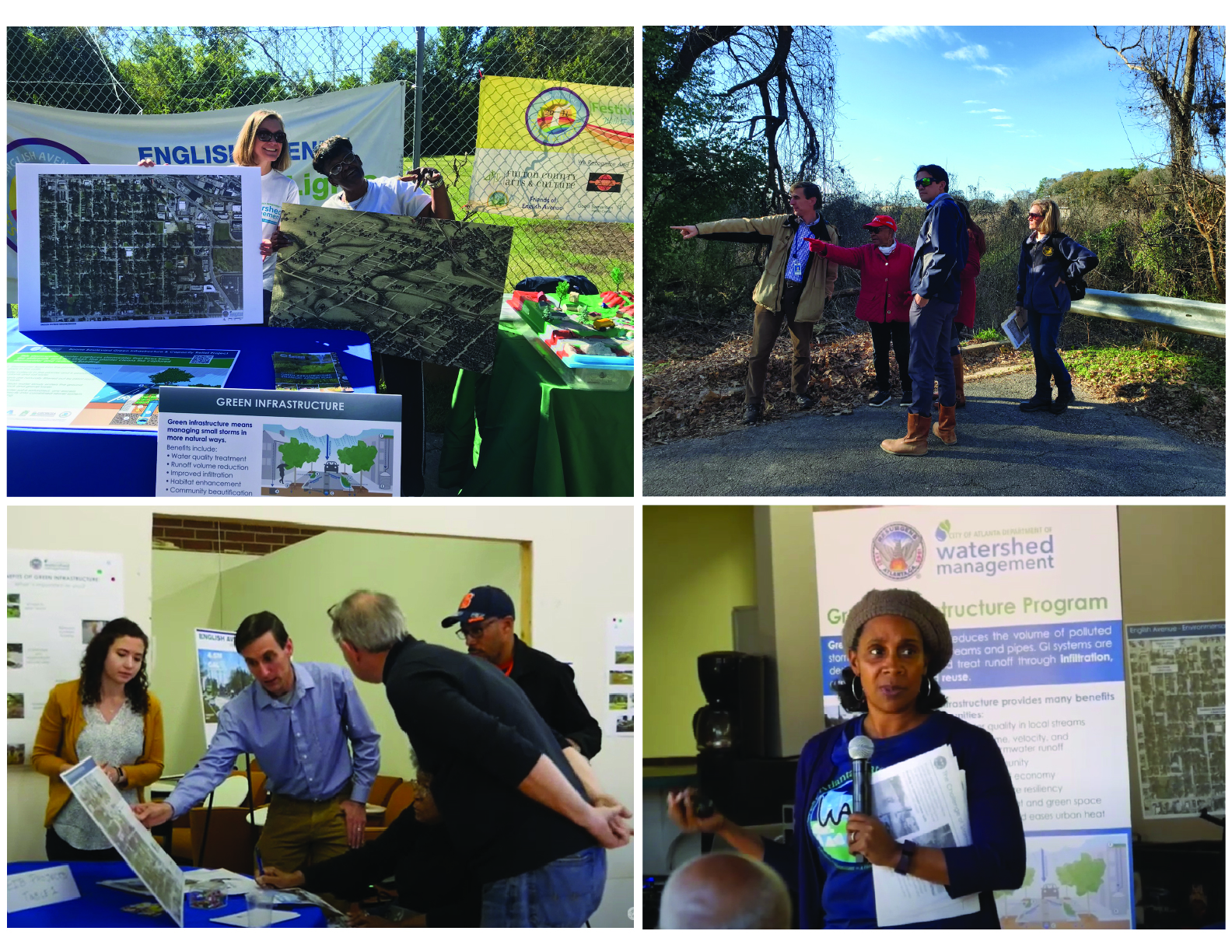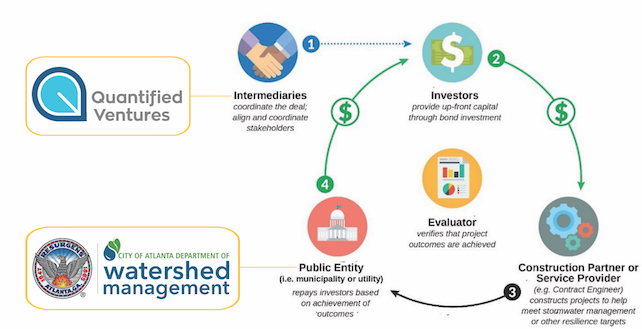Environmental Impact Bond (EIB) For Green Infrastructure
In Proctor Creek Watershed
With the support of the Rockefeller Foundation, Atlanta’s Department of Watershed Management (DWM) raised $14M to provide green stormwater improvements in the Proctor Creek Watershed.
In January 2019, DWM, in partnership with Quantified Ventures, the impact investment firm, and Neighborly, the mission-oriented broker dealer, announced the closing of the first publicly issued Environmental Impact Bond (EIB), which will finance green infrastructure in an area of the City that has been severely impacted by polluted stormwater runoff and flooding. Only the second EIB in the country – following one by DC Water in Washington, DC – this is the first to be offered in the public bond market. This innovative financing mechanism gives DWM access to $14 million in funding for green infrastructure that will reduce stormwater runoff, increase flood storage, and enhance the quality of life of Westside neighborhoods. EIB-funded projects were derived from existing plans, citizen concerns, and Green Infrastructure Task Force partnerships, and include a mix of urban ecosystem restoration and green stormwater management practices in both the combined and separate sewer areas of upper Proctor Creek watershed. The projects aim to alleviate local flooding and improve water quality and stream health, while also providing access to greenspace, improved air quality, public environmental education, restored native habitat, and green jobs. Collectively, the projects are projected to reduce stormwater runoff by 55 million gallons annually. Construction will begin in 2021, and all projects will be completed by 2024. The Atlanta EIB issuance was supported by a grant from The Rockefeller Foundation’s Innovative Financing program.
Summary fact sheet
Visit the Quantified Ventures website to download a Case Study on Atlanta DWM’s EIB.

Mayor Keisha Lance Bottoms announces that the City of Atlanta was awarded Rockefeller support to launch the first public Environmental Impact Bond, March 26, 2018, Park Pride Conference at the Atlanta Botanical Gardens

Proctor Creek Watershed
Proctor Creek is the only major watershed that lies entirely within the Atlanta city limits. Originating in downtown (where it is buried underground), the creek flows northwest all the way to the Chattahoochee River. Proctor Creek and its tributaries connect 38 neighborhoods with rich cultural and historical significance. The area was a focal point of the Civil Rights Movement and home to many influential figures, including Dr. Martin Luther King, Jr., W.E.B. Dubois, Maynard Jackson Jr., and Julian Bond, and is the location of the Atlanta University Center, the largest group of Historically Black Colleges and Universities in the country. Historically the creek was used for fishing, recreation, and community gathering, and served as a source of pride for community residents for generations, but in recent decades it has suffered environmental damage, particularly from stormwater runoff. Located directly downstream from the highly urbanized and impervious downtown area, the neighborhoods have been disproportionately impacted by flooding, pollution, and sewer overflows from the combined sewer system, as well as illegal dumping, brownfields, and other threats to public health. At the same time, the population of the watershed, which is 95% African American, has faced high rates of poverty, vacancy, crime, and unemployment. An environmental justice hotspot, Proctor Creek Watershed was included in the Urban Waters Federal Partnership’s efforts to revitalize urban waterways in underserved communities. Today numerous grassroots community and environmental groups are active in Proctor Creek, and DWM is working in partnership with them to protect and restore the health of the watershed and its residents. Learn more about the watershed here.
EIB-Funded Green Infrastructure Projects
1. English Avenue Green Streets
This project involves the construction of vegetated stormwater planter “bump-outs” in the right-of-way of select blocks of the English Avenue neighborhood to provide combined sewer capacity relief; improve drainage and reduce local flooding; and beautify streetscapes with trees, shrubs, and flowers. The planters will collect stormwater runoff from streets and sidewalks and slow and clean it before it reaches local waterways. In addition, unique sub-surface stormwater storage adjacent to the planters will increase the volume of stormwater that can be captured while retaining street parking.
Neighborhood: English Avenue
NPU: L
Council District: 3

Flooding in the English Avenue neighborhood (Credit: Chattahoochee Riverkeeper)


Examples of stormwater planter bump-outs on city streets



2. Greensferry Stream & Floodplain Restoration
This project will restore a portion of Proctor Creek south of Boone Boulevard that has been channelized since the 1960s, causing erosion and flash flooding. The concrete channel will be removed and >1,500 linear feet of the main stem and a tributary will be restored using natural channel design techniques and native vegetation. The restored stream and reconnected floodplain will provide significant storage during large storm events and reduce neighborhood flooding, as well as improve water quality and aquatic and riparian habitat. The improved site will provide the first public greenspace for residents in the Historic Hunter Hills neighborhood. DWM is working with The Conservation Fund and community stakeholders on a vision for the future use of the site.
Neighborhood: Hunter Hills
NPU: K
Council District: 3

Existing conditions in the Greensferry tributary include channelized stream, extensive invasive vegetation, and trash accumulation.




Example of a restored section of stream in Atlanta (McDaniel Branch)

3. Grove Park Green Infrastructure
This project will involve the installation of several bioretention features in a City Park using native plants, engineered soils, and stones to capture, slow, and filter stormwater runoff and improve water quality in receiving streams. The features will be aesthetically integrated into the park’s landscape to provide beautification as well as educational opportunities.
Neighborhood: Grove Park
NPU: J
Council District: 9
4. Mozley Park Green Infrastructure
This project will involve the installation of several bioretention features in a City Park designed to capture and infiltrate stormwater runoff from contributing impervious surfaces such as roads, sidewalks, parking lots and rooftops. These rain gardens and bioswales will also serve as aesthetic enhancements and educational amenities.
Neighborhood: Mozley Park
NPU: K
Council District: 4




5. Mosquito Hole Stream Restoration
This project will restore and stabilize 400 feet of aggrading, incised, and over-widened channel downstream of the North Avenue Combined Sewer Control Facility to provide floodplain storage for large storm flows, enhance aquatic and riparian habitat, and reduce standing and stagnant water that have created a public health nuisance.
Neighborhood: Historic Westin Heights / Bankhead
NPU: K
Council District: 9

Existing conditions in the Mosquito Hole tributary

6. Valley of the Hawks Constructed Wetlands
This project will create a series of ponds and wetlands in a vacant, low-lying area in the Historic Westin Heights neighborhood that will capture and filter stormwater before releasing it into Proctor Creek. The wetlands will provide combined sewer capacity relief, reducing flooding and overflows in the surrounding neighborhoods, and improve water quality in Proctor Creek. The site will also function as a community amenity and green space, and future improvements could include walking paths, boardwalks, signage, and art. DWM is working with The Conservation Fund and community stakeholders on a vision for the future use of the site.
Neighborhood: Historic Westin Heights / Bankhead
NPU: K
Council District: 3

Precedent photos of constructed wetlands



“In the News”
Atlanta Environmental Impact Bond Breaks Into Public Market – Conservation Finance Network, June 24, 2019
Atlanta’s Creative Financing for Green Projects – Georgia Social Impact Collaborative, April 26, 2019
DWM Commissioner Kishia Powell Presented with 2019 WaterNow Alliance Impact Award – March 27, 2019
Atlanta’s cutting-edge Environmental Impact Bond – Environmental Policy Innovation Center, March 21, 2019
Atlanta Issues Environmental Impact Bond for Green Infrastructure – Next City, March 11, 2019
Atlanta DWM completes first publicly-issued Environmental Impact Bond – Water Finance & Management, March 4, 2019
Quantified Ventures and Neighborly Announce First Publicly-Issued Environmental Impact Bond for City of Atlanta Department of Watershed Management – Quantified Ventures, February 21, 2019
Atlanta raises $14 million environmental impact bond from public – ImpactAlpha, February 21, 2019
Atlanta’s Seeing Green – The Rockefeller Foundation, March 26, 2018
Atlanta’s Department of Watershed Management Wins Environmental Impact Bond Challenge for Green Infrastructure and Resilience Projects on the City’s Westside – PR Newswire, March 26, 2018
Community Connections
DWM, with support from its fellow members on the Water Equity Task Force, has been working to assure that the EIB program achieves two critical objectives for the communities it will be serving: 1) authentic community engagement in project development and implementation, and 2) local workforce development.
DWM has participated in more than 25 community meetings to discuss and gather feedback on the EIB projects and outcomes. Local stakeholder groups include: Proctor Creek Stewardship Council, English Avenue Neighborhood Association, Grove Park Neighborhood Association, Friends of Mozley Park, Historic Hunter Hills Neighborhood Association, Historic Westin Heights / Bankhead Neighborhood Association, NPU-K, and NPU-L. In partnership with the Water Equity Task Force, DWM hosted a public open house on March 23, 2019 in the English Avenue neighborhood to present an overview of the EIB, its purpose, goals, and anticipated benefits, and share details on all six of the projects for public input.
Watch a short video on DWM’s 3/23/2019 EIB community meeting.
DWM is grateful for the partnership of the following organizations and agencies in the advancement of the EIB program and equitable Green Infrastructure initiatives throughout Proctor Creek and elsewhere:
Water Equity Task Force Partners
The Conservation Fund
West Atlanta Watershed Alliance
Partnership for Southern Equity
Eco-Action
Other Partners
Park Pride
Chattahoochee Riverkeeper
ATL Department of Parks and Recreation
Atlanta Beltline, Inc.
DWM is also working closely with WorkSource Atlanta, the City’s workforce development agency, and local training organizations (e.g., Greening Youth, Southface) to incorporate training, work experience, and employment opportunities for local residents into the construction and maintenance of the EIB-funded projects (“Green Jobs”).


What is an EIB?
An Environmental Impact Bond is a form of debt financing characterized by a Pay for Success component where the overall return to investors is linked partially to the degree to which the project(s) it finances achieve pre-defined environmental or social outcomes. Thus it aligns public spending with the outcomes issuers care about from projects, rather than for the projects alone. Actual project outcomes will be evaluated post-construction (by an independent third-party verifier) based on an established outcome metric – in Atlanta’s case, the volume of stormwater captured across all of the Proctor Creek green infrastructure projects. The diagram below depicts how the Atlanta EIB works.

Central to the EIB model is assigning an economic value to the project benefits and pricing these benefits into the performance-based financial structure. DWM estimated the total value of the EIB-funded projects to the City based on five important benefits of green infrastructure generates to communities: flood mitigation, water quality improvement, air quality improvement, urban heat reduction, and job creation. Investors take on a share of the risk of implementing these projects via a below market base interest rate; if projects do better than expected, investors are rewarded with a share of the additional financial benefits through a one-time performance payment, as illustrated below.
Key Atlanta DWM Environmental Impact Bond Terms:
- Bond Issuance = $14,000,000
- High Performance Threshold = 6,520,000 gallons (stormwater capture capacity)
- Value of Projects at High Performance Threshold = $20,000,000
- Performance Payment Amount = $1,000,000
- Performance Payment Date (if triggered) = November 2024
Links to various resources for further information on EIBs and the Atlanta DWM EIB
Webinar recordings:
- Emory Climate Talks: First Publicly Offered Environmental Impact Bond and City of Atlanta’s Efforts on Stormwater and Urban Resilience, September 11, 2020
- P3 Great Lakes Webinar: City of Atlanta Environmental Impact Bond (How to Successfully Create an Environmental Impact Bond: A Testimonial & An Opportunity), June 14, 2019
- Center for Climate and Energy Solutions (C2ES): “Making Cents of the Cost of Climate Change,” March 13, 2019
Papers & Background Documentation:
- City of Atlanta DWM Environmental Impact Bond Technical Memorandum
- “Financing Community Resilience and Green Infrastructure in Atlanta with an Environmental Impact Bond” (submitted to WEFTEC 2020)
- World Environmental and Water Resources Congress 2019 (ASCE) Proceedings: “Environmental Impact Bond: An Innovative Financing Mechanism for Enhancing Resilience in the City of Atlanta through Green Infrastructure” (https://ascelibrary.org/doi/10.1061/9780784482322.008)
- SCWC White Paper (pp. 32-38): “Financing Resilience in Atlanta Using an Environmental Impact Bond”
For Investors
Construction Updates / Quarterly Reports (to be posted upon issuance of initial Notification to Proceed)
Our Address
Department of Watershed Management Administrative Offices
72 Marietta Street NE
Mon-Fri – 8:15 am to 5:00 pm
City Directory
Need to contact another city department?

